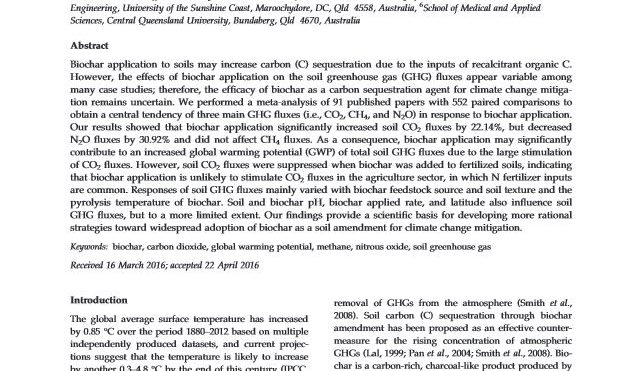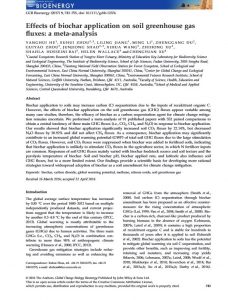Biochar application to soils may increase carbon (C) sequestration due to the inputs of recalcitrant organic C. However, the effects of biochar application on soil greenhouse gas (GHG) fluxes appear variable among many case studies; therefore, the efficacy of biochar as a carbon sequestration agent for climate change mitigation remains uncertain. We performed a meta‐analysis of 91 published papers with 552 paired comparisons to obtain a central tendency of three main GHG fluxes (i.e. carbon dioxide [CO2], methane [CH4], and nitrous oxide [N2O]) in response to biochar application. Our results showed that biochar application significantly increased soil CO2 fluxes by 22.14%, but decreased N2O fluxes by 30.92% and did not affect CH4 fluxes. As a consequence, biochar application may significantly contribute to an increased global warming potential of total soil GHG fluxes due to the large stimulation of CO2 fluxes. However, soil CO2 fluxes were suppressed when biochar was added to fertilised soils, indicating that biochar application is unlikely to stimulate CO2 fluxes in the agriculture sector, in which nitrogen fertiliser inputs are common. Responses of soil GHG fluxes mainly varied with biochar feedstock source and soil texture and the pyrolysis temperature of the biochar. Soil and biochar pH, the biochar application rate and latitude also influence soil GHG fluxes, but to a more limited extent. Our findings provide a scientific basis for developing more rational strategies toward the widespread adoption of biochar as a soil amendment for climate change mitigation.
Region: USA
Date published:
2016
Published by:
GCB Bioenergy
Type of resource:
Journal article
Resource topic:
biochar
Project/Programme: Not specific
Pest/Disease: Not specific
File type:
External link (555 KB)




